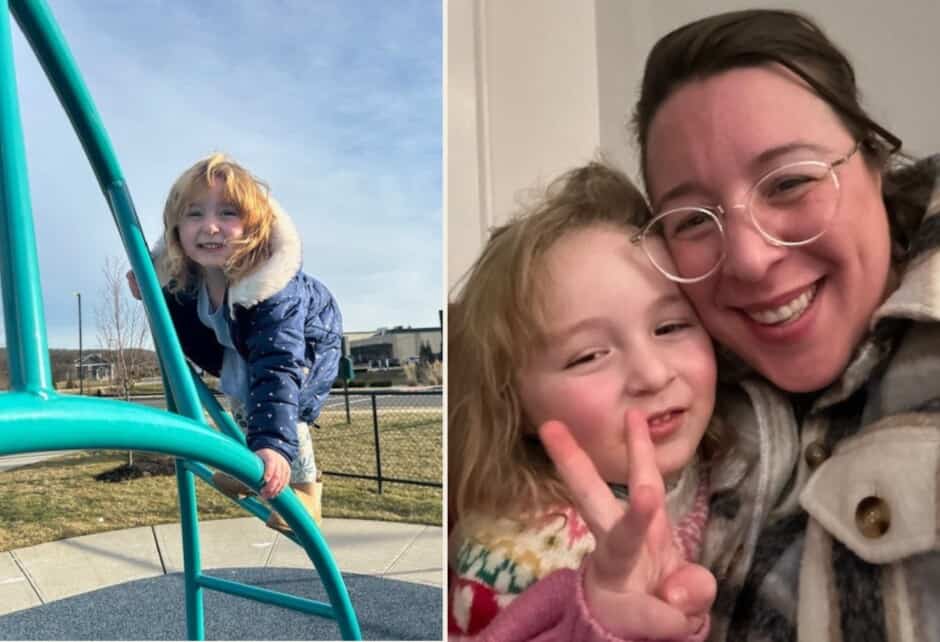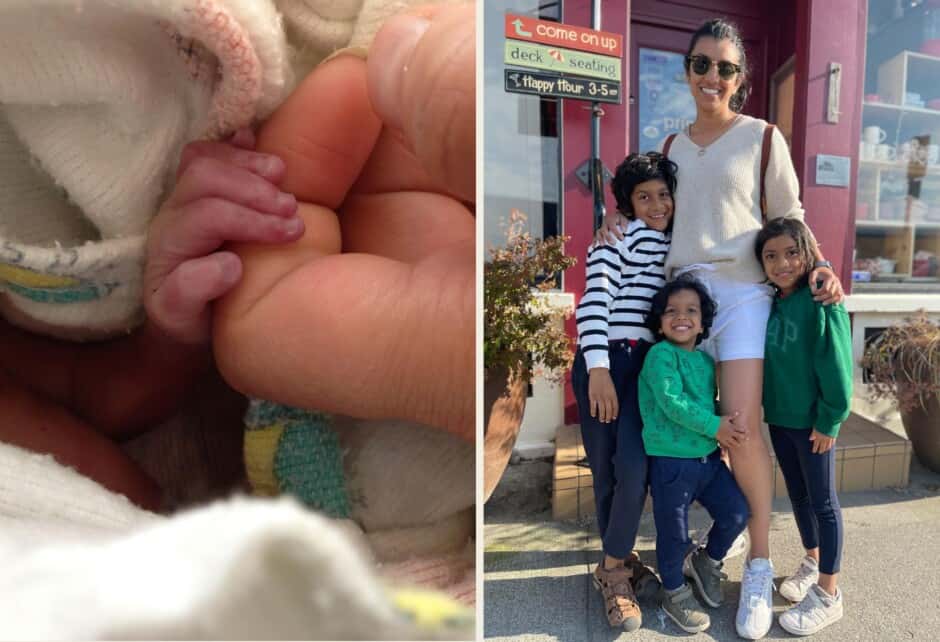
Mom Talk: Parenting in Captivity
Written by Katie Hintz-Zambrano
Photography by Photographed by Shola Lawson
While many of us currently cooped up with our families might kill for a so-called “sister-wife” right now, even those who have one—namely, cohabitating sisters Hannah Olavarria and Kelty Green—are hitting bumps in the road. In today’s Mom Talk essay, the twin sisters (whom we recently profiled) behind the podcast Upbringing fill us in on their current reality and how they are striving to find connection with their kids amidst the chaos.
Every day begins with so much promise. We’ve begrudgingly acknowledged that there’s a “new normal” upon us as our two families hunker down on our shared farm for the foreseeable future. We’ve staked out makeshift office nooks on our beds and in our closets. We’ve painstakingly crafted color-coded charts of work/school/family time, leaving not a single minute unclaimed. We’ve high-fived and relayed The Plan™ to the entire team, from toddler to partner…even the dog knows when he’ll be fed. Together, we’re prepared for anything! What could possibly go wrong?
Oh yes, KIDS.
Kids—who couldn’t care less about order, reason, productivity, moderation, gravity, quiet, safety, deadlines, personal space, napkins, rules, reason, or our beloved Plan™. Kids who melt down constantly, spark inane fights with siblings, refuse to give us the space to work, and leave a path of sticky destruction in their wake. Whether we’re hopping on a work call or simply trying to heat up a frozen pizza, our kids’ incessant demands and fierce resistance can leave us feeling trapped. Desperate. Wild.
We lecture, avoid, rage, work, weep, apologize, drink wine, scroll the news, and wake up to do it all over again. Let’s get real—most of us have never spent this much time at home. Working. With kids. Parenting in captivity has felt downright unnatural, not to mention unfair, for two ladies who had finally carved out a relatively successful work-life balance. Our toughest moments as full-time caregivers of four kids under the age of six have revealed a painful reality: we’re way out of our depth. What’s worse, we’re haunted by a nagging feeling reminiscent of early motherhood: are we somehow failing everyone and everything?
After weeks of fighting futilely to tame the mayhem that we now call life, we’re endeavoring to reexamine our roles in the chaos. We can’t control the state of the world. We can’t control our work. We can’t control our kids. We can’t even control toilet paper. But when we can begin to redefine our expectations around this confining landscape and our kids’ messy impact on it, we’re able to identify one overlooked element that is absolutely within our grasp…an essential piece of the puzzle that’s been there all along: our power as parents.
Contrary to all we’ve grown up believing, the methods of control traditionally wielded with threats, incentives, punishments, time-outs, and consequences stems not from power, but from powerlessness. Genuine parenting power, on the other hand, invites us to bravely lean into the learning opportunities we’ve rushed through or missed entirely in the name of order and harmony. This power is defined by a long-standing value and slow-growing skill that our parenting approach at Upbringing is built upon: connection. The magic that holds a family together.
Indeed, these small, tireless humans push us to the limit like it’s their job. They perform maddening feats of selfishness in an impressive attempt to get their needs met with the limited skills they currently possess. And though our children can often feel like irritating obstacles to our productivity or threats to our sanity, they are guiding the way to our family’s growth from the inside out.
What we previously saw as misbehavior, we now recognize as our kids’ primal attempt to drag us, kicking and screaming, into the present moment to grow up alongside them. Ultimately, our kids’ daily challenges are powerful reminders of our call to rise up and connect, rather than correct, when the going gets tough. To non-judgmentally support rather than judge their feelings and voices. To graciously seek to meet everyone’s needs rather than minimize or resent them. To lighten up and laugh when we can rather than take everything so personally. To fight against our unconscious reactions rather than our family so that this uncertain and intense period of time brings us closer rather than further apart.
It’s easy to imagine spending the day with our faces desperately pressed to the windows, wishing social distancing laws could also apply within the home. But we don’t have to, because each day and every challenge can be a wild adventure to break the cycle, start fresh and make some different choices as parents. We’re trying to see this communal confinement as an inspiring, albeit scary, experiment—a once-in-a-lifetime opportunity to bravely fail forward as we raise our awareness, clarify our intention, and nurture our connection with the people that matter most.
Our current circumstances can’t determine our happiness; only we can. And only we can choose to redefine this state of captivity as an unlikely path to freedom itself. So, rather than resist or permit our kids’ unruly nature, we’re working to attune to it with a sense of curiosity, vulnerability, and gratitude for the gift of growth and connection it invites. We have the power to consider our practices and, when we’re able, look beneath our kids’ words and behaviors for the deeper needs. We have the power to calm our bodies, help their bodies, and translate everyone’s confusing feelings and intentions. We have the power to get clear on and uphold our limits and boundaries as lovingly as possible. We have the power, after we lose our minds completely, to circle back with them to process, repair, and plan for next time. In parenting, there is always a next time.
Adventurer, writer, and environmentalist John Muir’s famous words hang poster-sized in the center of our farmhouse. Though we’ve glanced at it daily for years, the quote is only now coming into focus for the first time: “All wildness is finer than tameness.” Looks like we’ve found The New Plan™.
Kelty Green & Hannah Olavarria are twins, mothers, and feminists parenting for sanity and social change through their podcast and video series, Upbringing. Learn more about their coaching, speaking, and RESIST Approach on their website and catch live Parenting In Captivity Q&As weekly on Instagram.
Are you a mother with something to say? Send us an email to be considered for our “Mom Talk” column.
Share this story



